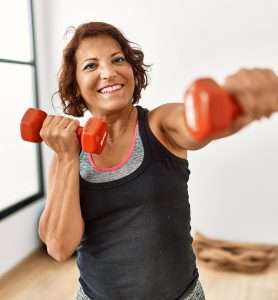Healthy aging: Embracing life after menopause
When it comes to healthy aging, menopause doesn’t always get the attention it deserves.

We’ve all heard jokes about hot flashes and night sweats, but life after menopause (defined as 12 months without a menstrual cycle) is often the start of a different journey. In fact, the average woman could potentially live up to 40 percent of her life in these post-menopausal years, says Hillary Wright, M.Ed., RD.
“Medicine has gotten good at keeping people alive for a long time. But that doesn’t mean that your quality of life is necessarily going to be what you want it to be. That makes it much more important that you start thinking about how you want the quality of those years to be based on the best of your ability to influence them with diet and lifestyle,” she says.
Wright is the director for nutrition counseling for the Wellness Center at Boston IVF in Waltham, MA, and a senior nutritionist at the Dana Farber Cancer Institute in Boston. She and her colleague, Elizabeth (Liz) Ward, M.S., RD, recently authored a book, The Menopause Diet Plan, which offers evidence-based ways to manage physical and emotional health during perimenopause, menopause, and post-menopause. You can also find the duo on Instagram @menopausedietplan.
“Liz and I have discussed that we probably should have worked into the subtitle something about healthy aging and beyond because all of the things that we talk about in the book are actually healthy aging tips” Wright says. “We strongly object to people talking about life after menopause being the beginning of the end, when in reality there’s a lot of freedoms that come along with that phase of life.”
We know the importance of physical activity and maintaining quality of life, no matter what your age, but once your estrogen level starts to decline and you get into the post-menopausal aging years, it becomes more difficult to retain muscle mass.
“Muscles are the key to independence,’” says Wright. “They’re the key to being able to physically do the things that you want to do that make you happy for as long as humanly possible. And the old adage of use it or lose it is 1,000 percent true with muscles.”
Wright recommends at least 30 minutes of physical activity a day, and in addition, at least two to three sessions of strength training a week. Strong muscles also protect your joints, and all you need is some resistance to get started, such as inexpensive exercise bands, some hand weights or even cans or jugs you have at home. You can find classes online, at your local senior center or YMCA.
“It’s really about just being able to live independently and continue to do those things that make you happy,” she says, adding it’s important to also eat enough calories and protein each day to build and maintain those muscles and your immune system.
“Healthy eating is about balance,” she says. “There is a lot that we can do with the quality of our diet and our lifestyle habits to maintain muscle strength and energy and potentially mediate some of the side effects that come along with menopause that women find so distressing.
Recent Posts
Categories
- Aging Unbound
- Annual Golf Classic
- Ask Joan – Weekly Q and A Column
- Caregiver Events and Workshops
- Caregivers Connect
- Caring for Someone with Alzheimer’s or Dementia
- Changing Aging
- Community
- COVID19
- Digital Access
- For Families and Caregivers
- General
- General Ideas and Support
- Geriatric Support Services
- Grandparents / Kinship Caregivers as Parents
- Health Worker
- Healthy Aging
- Inspiring Aging
- LGBTQ+
- Long Distance Caregiving
- Making Connections
- Medicare Resources
- New to Caregiving
- Nutrition
- PCA
- Program Update
- Resources
- Scam Alert
- Self Care for the Caregiver
- Uncategorized
- Veterans
- Volunteering
- What’s New Out There
- Years of Service
Tags
Affordable housing agespan Alzheimer's awareness caregiver Caregiver Care caregivers Caregiver Support clutter Cognitive community Connection Dementia diabetes education General Caregiving golf golf classic Grandparents health healthy aging hiring Hoarding housing learning Long Distance Medicare meditation memory cafe Memory Loss mental health Music and Memory Nutrition older adults older americans month personal care report elder abuse Resources Self Care SHINE taichi tournament volunteer wellness Yoga
